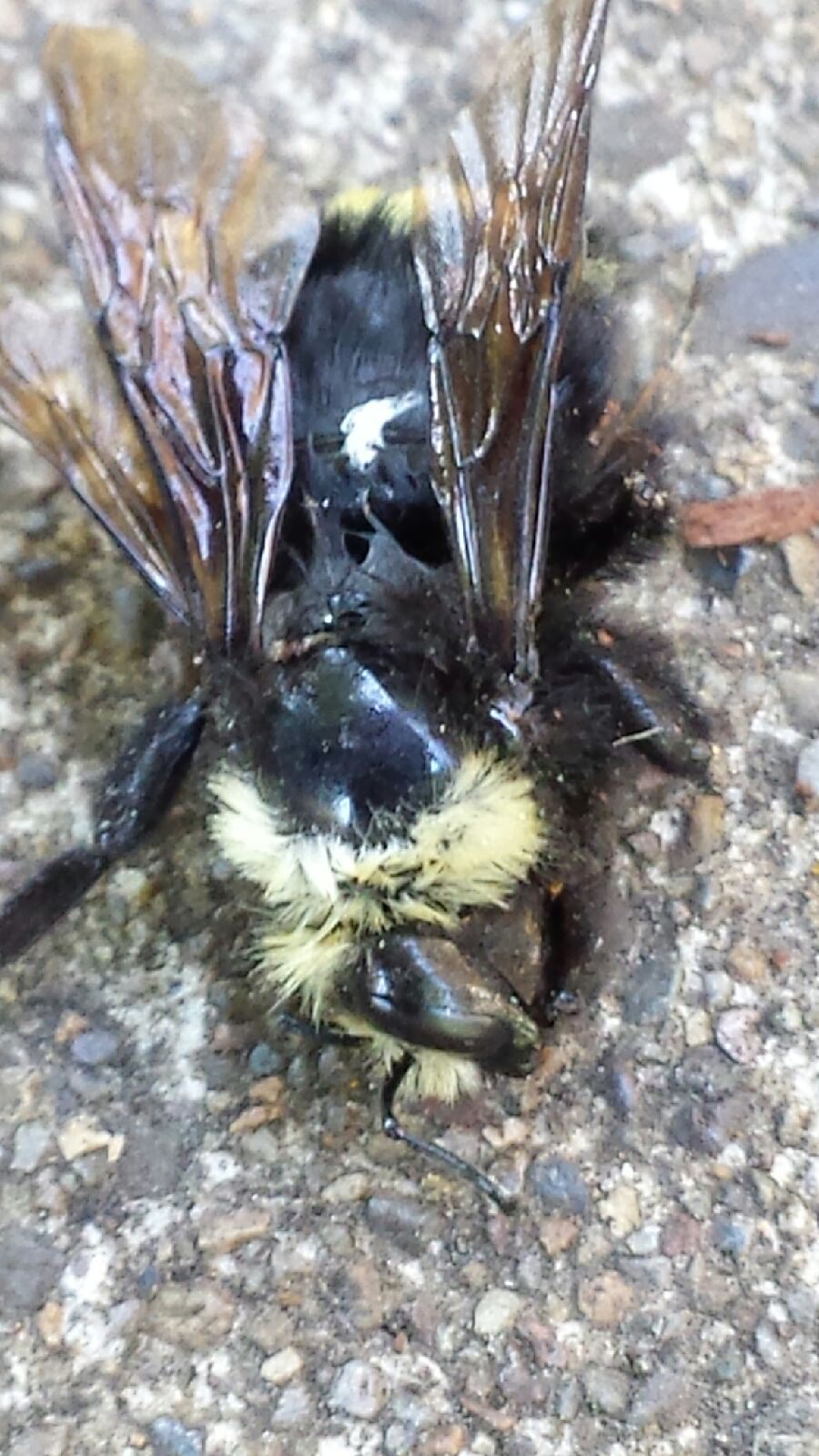Here it is summer time, when the flowers and trees are in bloom and jamborees of pollinators are busily buzzing in the flowers. It is also National Pollinator Week, a time to celebrate what bees, butterflies and other blossom-visiting species contribute to a healthy environment.
But we in Eugene, Oregon are mourning the loss of thousands of bees today. Exactly one year after the massive bee die-offs in the Portland area last summer, thoughtless pesticide applicators turned their spray nozzles onto blooming linden trees in Eugene with devastating results. The spray of imidacloprid, a neonicotinoid product, caused the death of bumble bees, lady bugs, butterflies and even frogs.
I wish I was writing about a chili cook-off or a muffin bake-off, instead of a die-off.
Today I drove out to West Eugene to find out more...was there really a bee die-off? The scene is an apartment complex in West Eugene landscaped with tall beautiful trees, among them linden trees.
There were bee casualties everywhere I looked. Thousands of bumble bees carcasses were strewn throughout the property as well as bees still in the throes of spasms and seizures. The leaves on the linden trees were glistening with a chemical residue, three days after the spray. Even now, both bumble bees and honey bees are actively foraging for food and pollen in the flowers. That means pollinators are continuously being exposed to the poisons and dying as a result. Children ran around barefoot and picked up the fallen, furry ones. A chemical smell hung in the air.
During early summer, linden trees, a type of Tilia species, sport creamy-yellow, star-shaped flowers amongst their heart shaped leaves. The purpose of the foliar spray to the linden trees blooming throughout the apartment complex was to kill aphids. Although aphids were the target, instead countless bees, ladybugs, butterflies and other creatures were killed.
How ironic to celebrate National Pollinator Week in Eugene, America’s Most Bee-Friendly City (the city has banned the use of neonicotinoids on city property) while witnessing the suffering of the bees who fell prey to the pesticide spray. The tragedy is due, in large part, because of the Oregon Department of Agriculture’s unwillingness to take necessary and appropriate action to protect pollinators.
Last year, the agency made a weak concession to ban two neonicotinoid products from use on blooming linden trees. Imidacloprid, the pesticide used in West Eugene this week, is one of them. But there are lots of loopholes and contingencies in the lackluster regulation that may have allowed this spray to take place. Right now, the agriculture agency should be rushing to have those linden trees in West Eugene netted so that bees can’t reach the flowers to prevent additional bee deaths.
Beyond Toxics continues to recommend that neonics be banned in Oregon, on par with our European counterparts. In addition to killing bees, this class of pesticides is known to contaminate soil and water for as long as seven years after application. How can we be so careless as to leave this kind of legacy for our children?
What can be done to make a right out of this wrong? Can we learn from this Eugene-version of a silent spring?
Here is what each of us can do.
- Bees are especially sensitive to insecticides, so avoid using pesticides. These chemicals kill beneficial insects including pollinators & natural enemies that control common pests like aphids. Instead, use ladybugs, a natural predator of aphids. Or wash plant leaves with lots of water or Safer soap.
- To control pests, judiciously use homemade remedies such as garlic spray, vinegar or pesticides derived from plants or microbes. Make your purchases from stores that have pledged not to sell neonics and avoid the stores that continue to sell bee-killing pesticides.
- Call or write to Governor Kitzhaber and tell him you want these products no longer sold in Oregon. He recently convened a Governor’s Pollinator’s Task Force. He can set the parameters for the work he wants them to accomplish.
- This Saturday Beyond Toxics and the Oregon Sustainable Bee Keepers are celebrating National Pollinator Week with a booth at the Saturday Farmer’s Market. Come visit our booth and sign a petition to protect bees!
Bee kind to bees - our fate and the fate of bees are closely linked.
Bumblebee die-off in Eugene under investigation (6/19/14) By Tracy Loew, Salem Statesman Journal





